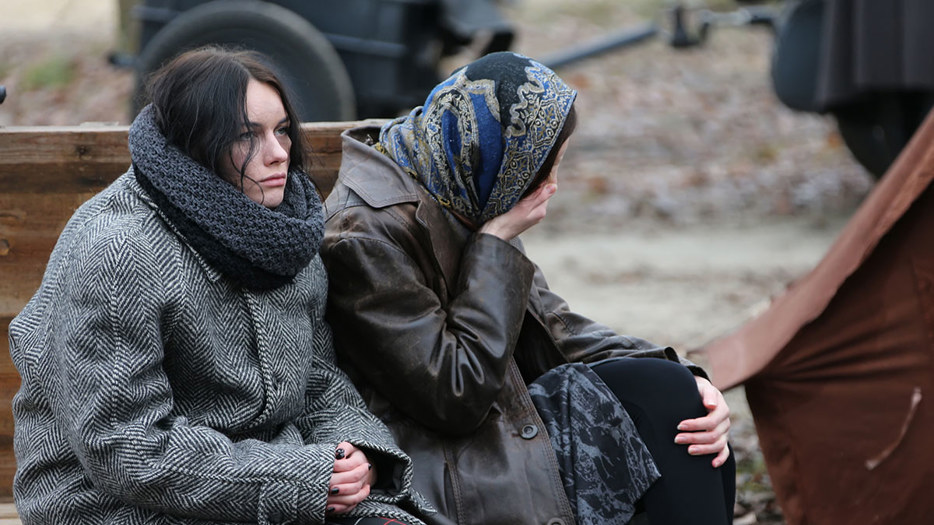Women and girls are severely affected in Ukraine
INTERNATIONAL WOMEN'S DAY. Russia's invasion of Ukraine is hitting already vulnerable groups hard. Women and girls escaping the country are at risk of being sexually exploited, pregnant women have been forced to give birth in basements and the risks for LGBTQI people to suffer from violence and discrimination while fleeing are high.

Since 2014, the Ukrainian population has been living in strained conditions, both with Russia's annexation of Crimea and the fighting in the country's eastern regions of Donetsk and Luhansk. When the Russian military launched its invasion of Ukraine on February 24 this year, the situation quickly turned disastrous.
Men and boys are at risk of injury and death in combat, while women and girls are at risk of being injured or killed when attacked in their homes or when they are on the run. Furthermore, women and girls are exposed to health problems related to sexual exploitation, early pregnancies, the lack of medical care and opportunities to maintain their hygiene.
News reports focus on women more than before
Annika Karlsson is head of unit at the Department of Policy Analysis at the Swedish Gender Equality Agency. She perceives that women's volunteering in Ukraine, such as helping refugees, is now given more attention than in many other conflicts.
"We see and hear more female voices from Ukraine such as experts, reporters, refugees and aid workers. Women are portrayed as active citizens and have a certain agent in the news, although the work of civil society is not reported to such an extent. Despite the fact that women are allowed to leave the country, many still choose to stay, for example in Kiev, and share what they are experiencing", she says.
Gender equality work in Ukraine was already under severe pressure before Russia's invasion, especially in the eastern regions. Since 2014, the Organisation for Security and Cooperation in Europe (OSCE) has held an observer mission in Eastern Ukraine. They say that gender-based violence and human trafficking are rampant in the area and according to the UNDP, one in five Ukrainian women and girls between the ages of 15 and 49 has experienced violence. As a result of these developments, in 2017 the Ukrainian Parliament passed a law criminalising domestic violence as well as a law to prevent and combat domestic violence.
Men's violence against women increases during conflicts
"Women can be subjected to all kinds of violence in war and conflict. Getting into combat, dying or being injured is a huge risk, especially now that civilian targets are being bombed in Ukraine. The risk of sexual violence and exploitation is high. According to research, abuse and domestic violence tend to increase and hit women hard as a result of war and armed conflict. Especially in the chaotic situation that war creates, with increased lawlessness together with lack of police control and functioning social institutions", says Annika Karlsson.
The OSCE strives to strengthen women's participation and leadership. Despite efforts, women are rarely allowed to participate in peace negotiations. According to the Swedish NGO Kvinna till Kvinna (Woman to Woman), women who have been working on peace building in Eastern Ukraine for the past eight years to try to resolve the conflict have been met with hatred, threats and suspicion. Russia's invasion means that they now have reason to fear for their lives.
Forced to give birth in basements
On 4 March, a web conference was organised by the Global Network of Women Peacebuilders, where participants from Ukraine and its neighboring countries talked about the ongoing humanitarian crisis. One of them was Tamara Ohorodova, Chairperson of the Ukrainian charitable foundation Unity for the future:
"We feel anger, pain and fear. We help women and children in burning cities, in crumbling houses, who have been sitting in their basements for several days, for example in Chernihiv and Kharkiv. Because of the ongoing shelling and bombings, women are forced to give birth in basements and subways", she says.
LGBTQI people and feminists perceived as a threat to the nation
Shortly after Russia launched its invasion, all men between the ages of 18 and 60 were banned from leaving Ukraine. Something that not only divides families, but also affects LGBTQI people. Singer Zi Faámelu tells CBS News how she barricaded herself in her apartment in Kiev. She wants to escape, but is unable because it says "man" in her passport. She also describes that the situation for transgender people even before Russia's invasion has been bleak. Transgender people feel invisible and inhumanely treated, and she is now afraid of what will happen if she tries to escape.
"There are often strong beliefs about gender and nation, not least in the context of war and conflict. For example, the role of a woman as a mother who, especially in times of war, is supposed to bring new soldiers to the nation. It creates a narrative about the nation as a mother. Studies on the relationship between gender and nation find that feminists who question gender roles are considered an enemy on the inside that threatens national unity. They can be subjected to threats and elements of treason are often included in the rhetoric", says Annika Karlsson and continues:
"The fact that war recreates traditional gender roles is one picture of media reporting, but not the whole picture. Women fleeing and men staying behind to fight dominate the news right now. It's not an untrue picture, but it's a picture, among others. Women are often very active in civil society. In western Ukraine in particular, there is still functioning civil society where women lead and organise much of the work in, suchas aid to refugees."
Publication date: 9 March 2022
Last updated: 11 June 2024
